
Slack is one of the most popular team communication apps for work. Some may call it a glorified IRC, but that doesn’t impact its popularity.
It is available for free with additional features offered in its paid plans. Though Slack can be installed on Linux, it is not open-source.
So, here, I’ll list a few open source Slack alternatives that you can try as a replacement.
Slack Alternative Software That Are Open Source

The software mentioned here are open source, which means you could install them on your server (self-hosting) and thus control the data.
You may also opt to pay for the managed hosting for some of these Slack alternatives. A few of them provide both free and paid options.
That’s how some open-source projects make money. You can take the trouble of hosting it on your own or pay for a hosted service offered by the project itself.
Let’s take a look at what options you have to replace Slack and Microsoft Teams.
Note: The list is in no particular order of ranking.
1. Element
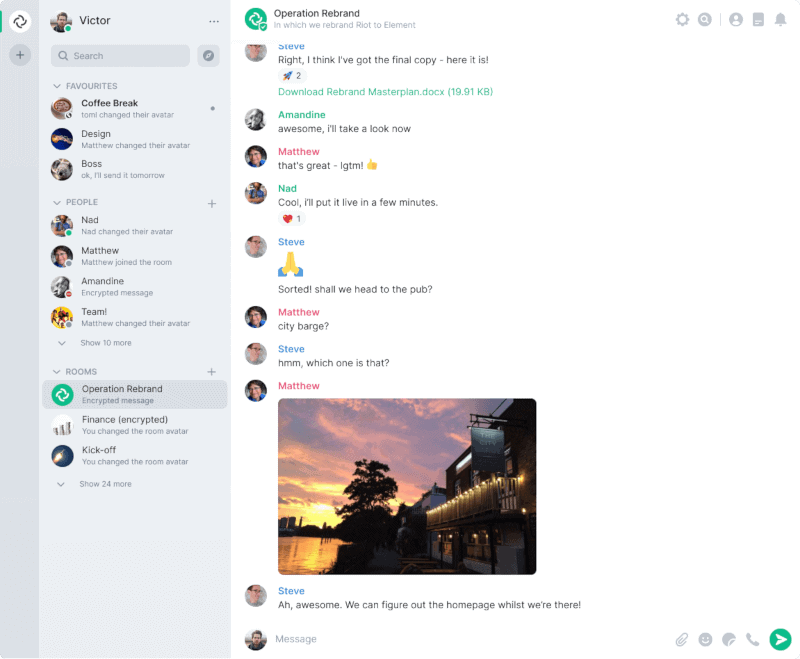
Key Highlights:
- Decentralized Communication
- Cross-platform support
- Built on Matrix
- Self-hosting supported
- Third-party integrations supported
- Free and paid options available for managed hosting
While Element (formerly known as Riot.im) has been a decent Slack alternative since its first stable release, it offers many essential features that most Slack users can utilize. You can choose to use the public Matrix servers for free or the premium hosted servers for yourself.
To start with, you get cross-platform support, so once you’ve set up your server (or by using the free public server), all you have to do is create rooms/communities. Rooms are like the channels, and the communities act as a new group/server.
Everything should work flawlessly, ranging from sending messages to attaching files. You do not get end-to-end encryption in a room by default. So, you will have to enable it in the room settings.
The official FAQ docs should help you out with that.
You can also explore more about it in our dedicated Element article.
2. Zulip Chat
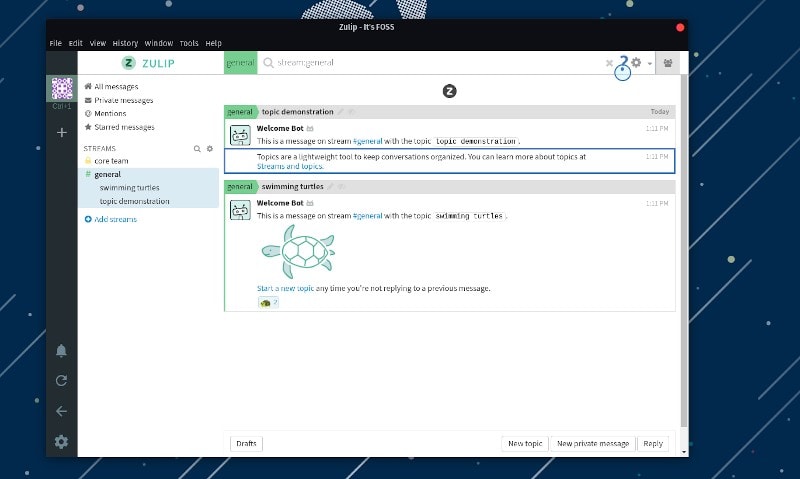
Key Highlights:
- Advanced threaded conversation
- Self-hosting supported
- Integration support with Matrix
- Third-party integrations that include GitHub as well
- Cross-platform
- Free and paid options are available
Zulip Chat is a good open-source team chat software.
Not just limited to the open-source enthusiasts, Zulip Chat offers some really useful features when compared to Slack in general. The threaded conversations with the ability to filter by topics are a plus.
So, you can just join back to an older conversation without needing to scroll down hours of gibberish messages that weren’t probably meant for you in a channel.
The user experience may not be as good as Slack, but it should be good enough for most. You can either choose to install Zulip on your server or use Zulip’s hosted solution for free with limitations (or upgrade it to unlock features). You can also take a look at their GitHub page to learn more.
3. Rocket.Chat
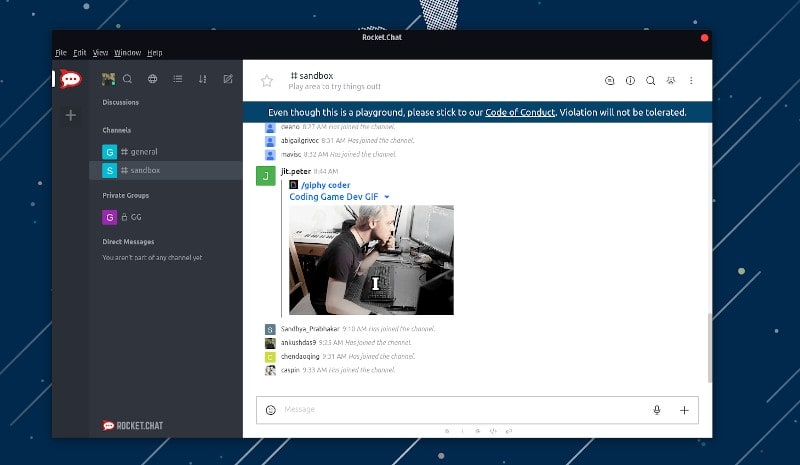
Key Highlights:
- Cross-platform
- User support helpdesk integration support
- Real-time translation
- Audio/Video conferencing
- Third-party integrations
- Matrix-integration supported (Decentralization)
- Self-hosting supported
- Free and paid options available
Rocket.Chat is an impressive Slack alternative. In fact, we use it for internal team communication at It’s FOSS.
Originally, it was a similar offering to Slack. However, now it supports the Matrix protocol, which helps make it a decentralized solution as well.
The user interface is excellent, and you can choose to customize the look of it by creating your own theme packages. In addition to all the essential features that Slack offers, it also supports video/audio conferencing, which is significant to some. You can host it yourself with limited features for free, or opt for premium cloud hosting options.
Using end-to-end encryption with Rocket.Chat is a one-click task as well. Personally, I like the user experience better when compared to the others on the list—but that’s just me. You can also navigate by their GitHub page to explore more about them.
4. Mattermost
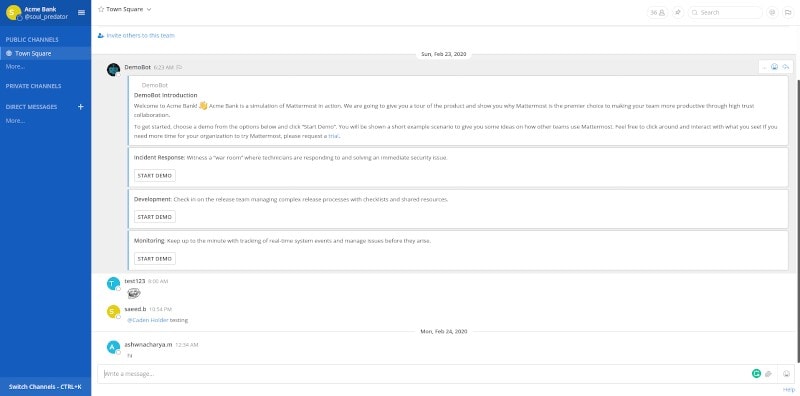
Key Highlights:
- Cross-platform
- Tailored mostly for enterprise use
- Free and paid options
- Real-time group chat
- Third-party integration
- Self-hosting supported
- UI/UX Customization supported
Unlike others, Mattermost is an enterprise-focused Slack alternative. You wouldn’t be too surprised that you may not like to use it for personal use.
You can opt to deploy the open-source edition for free but you will be limited to the free features. So, it is highly likely that you have to request a trial key before purchasing the license for Mattermost.
For obvious reasons, you won’t be able to try anything on your desktop unless you have a trial key because the demo is limited to their online website as a temporary session. Unless you’re an enterprise that needs something very similar to Slack but open-source, I don’t think you’d need this. If you’d like, you can also take a look at their GitHub page.
5. Wire
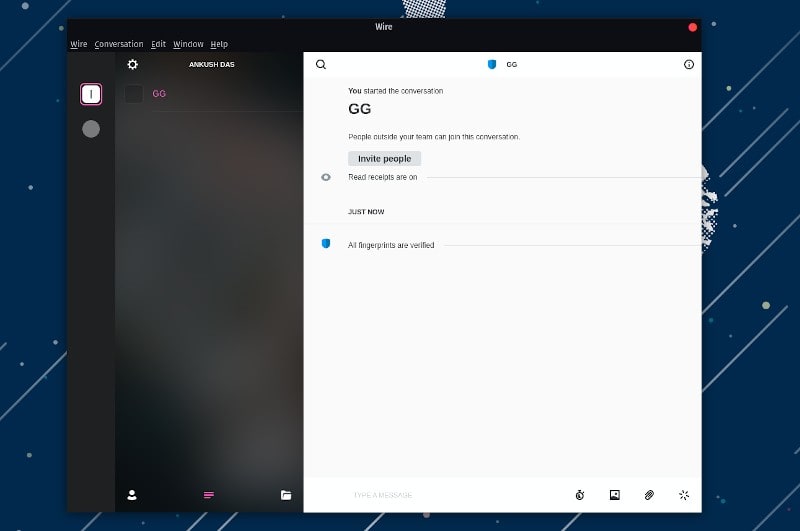
Key Highlights:
- Cross-platform
- No free options (30-day Trial offered)
- Text, voice, and video chats
- Privacy-focused
- Self-hosting option available for Enterprise
We’ve already covered Wire as an alternative to Slack in one of our previous articles. It is indeed a useful open-source solution that focuses on privacy while giving a premium UX for users looking to switch from Slack.
You would need to opt for the Enterprise-focused premium plan if you want a custom deployment for Wire. You can try the hosted pro version (Desktop/Mobile) for free for up to 30 days but for a private hosting deployment, you have to contact them.
Furthermore, you can learn more about it on their GitHub page or simply visit the official website through the button below.
6. Twake
Key Highlights:
- Cross-platform
- Nextcloud-like features to enhance collaboration.
- Privacy-focused
- Self-hosting supported.
Twake is a full-fledged collaboration platform with Nextcloud-like features.
You can choose to limit your usage to channels for text, voice, or video interactions. If required, you can also use it to manage documents for your team/company, manage to-do lists, and create a kanban project board as well.
Wrapping Up
Slack is unquestionably a good team chat app, but if you want to stick with an open-source solution, you can try one of these recommendations.
Feel free to try them and let me know your thoughts in the comments. Moreover, please let me know if I missed something that’s potentially an open-source Slack alternative!
It's FOSS turns 13! 13 years of helping people use Linux ❤️
And we need your help to go on for 13 more years. Support us with a Plus membership and enjoy an ad-free reading experience and get a Linux eBook for free.
To celebrate 13 years of It's FOSS, we have a lifetime membership option with reduced pricing of just $76. This is valid until 25th June only.
If you ever wanted to appreciate our work with Plus membership but didn't like the recurring subscription, this is your chance 😃

